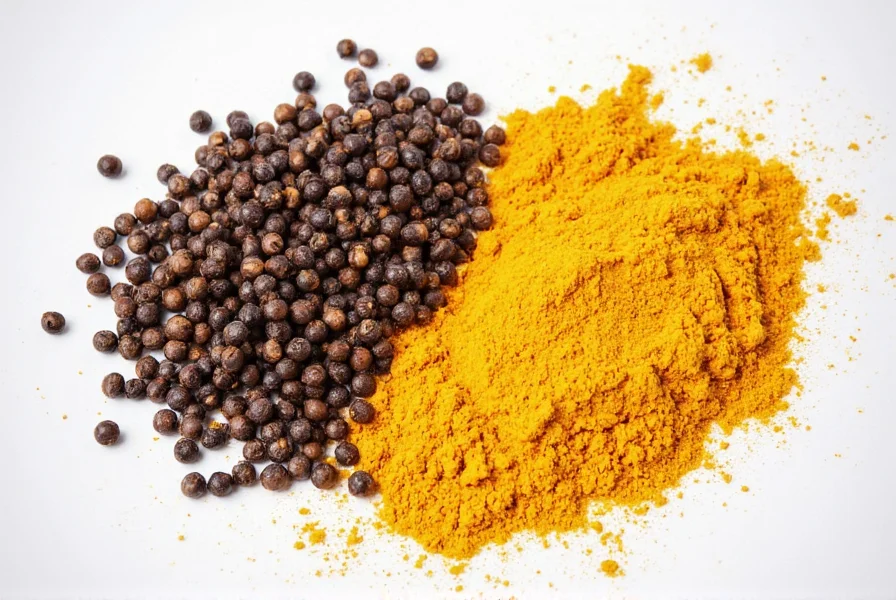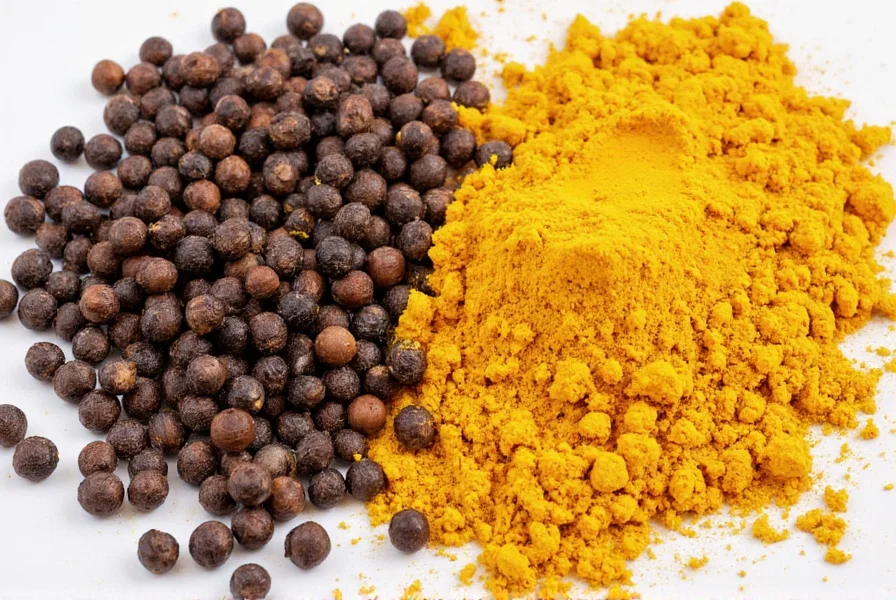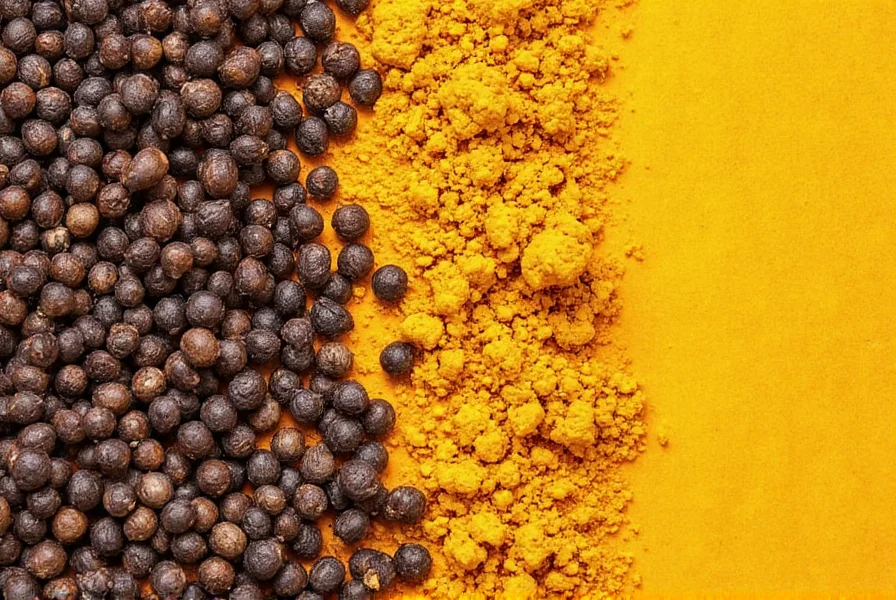Black pepper significantly enhances the bioavailability of curcumin, the active compound in turmeric, by up to 2,000%. This scientifically proven synergy occurs because piperine (the key component in black pepper) inhibits certain digestive enzymes and increases intestinal absorption, allowing your body to utilize turmeric's health benefits more effectively.
The Science Behind Black Pepper and Turmeric Synergy
Curcumin, the primary bioactive compound in turmeric, has notoriously poor bioavailability when consumed alone. Research shows that only a small fraction of ingested curcumin enters the bloodstream due to rapid metabolism and elimination. This limitation significantly reduces its potential health benefits despite turmeric's impressive therapeutic properties.
Black pepper contains piperine, a natural alkaloid that addresses this challenge. A landmark study published in Planta Medica demonstrated that combining just 20mg of piperine with 2,000mg of curcumin increased curcumin bioavailability by an astonishing 2,000%. The mechanism involves piperine's ability to inhibit glucuronidation in the liver and intestines—a process that normally breaks down curcumin before it can be absorbed.
| Study Component | Without Black Pepper | With Black Pepper | Improvement |
|---|---|---|---|
| Curcumin Bioavailability | Low (rapid metabolism) | Significantly increased | Up to 2,000% |
| Blood Concentration | Peaks quickly then drops | Higher peak, sustained levels | 60-70% longer duration |
| Therapeutic Effectiveness | Limited | Substantially enhanced | Markedly improved outcomes |
Health Benefits of the Black Pepper and Turmeric Combination
The enhanced bioavailability from combining black pepper and turmeric translates to more significant health benefits. Curcumin is renowned for its potent anti-inflammatory and antioxidant properties, which may support:
- Joint health and mobility for those with arthritis
- Cardiovascular function through improved endothelial performance
- Cognitive health by potentially reducing neuroinflammation
- Metabolic health markers including blood sugar regulation
When curcumin absorption improves thanks to piperine, these benefits become more pronounced. Research in Phytotherapy Research indicates that the combination shows greater efficacy in reducing inflammatory markers compared to turmeric alone. This makes the black pepper turmeric combination particularly valuable for managing chronic inflammatory conditions.

Practical Applications: How to Use Black Pepper and Turmeric Together
Understanding the science is valuable, but implementing it effectively matters most. Here's how to maximize the benefits of this powerful combination:
For culinary use: Add 1/4 teaspoon of freshly ground black pepper to every teaspoon of turmeric in your recipes. The heat from cooking helps release curcumin, while the piperine ensures your body can absorb it. Golden milk, curries, roasted vegetables, and salad dressings all benefit from this pairing.
For supplementation: If using turmeric supplements, choose formulations that include black pepper extract (typically standardized to 95% piperine). The optimal ratio is approximately 100:1 (curcumin to piperine), meaning for every 1,000mg of curcumin, you'd want about 10mg of piperine.
Daily dosage considerations: Research suggests effective daily doses of curcumin range from 500-2,000mg. When combined with piperine, lower doses become more effective. Most studies showing benefits use 500mg of curcumin with 5-20mg of piperine, taken once or twice daily.
Safety and Considerations
While both black pepper and turmeric are generally safe as culinary spices, higher therapeutic doses require consideration:
- Medication interactions: Piperine may affect how certain medications are metabolized. Those taking blood thinners, diabetes medications, or antidepressants should consult healthcare providers before using high-dose supplements.
- Digestive sensitivity: Large amounts of black pepper may cause stomach upset in sensitive individuals. Start with smaller amounts to assess tolerance.
- Blood thinning effects: Both turmeric and black pepper have mild anticoagulant properties. Those with bleeding disorders or scheduled for surgery should use caution with high doses.
- Pregnancy considerations: Culinary amounts are generally safe during pregnancy, but therapeutic supplementation should be discussed with a healthcare provider.
The black pepper and turmeric combination represents one of the most well-documented natural synergies in nutritional science. By understanding how these two common spices work together, you can make more informed decisions about incorporating them into your wellness routine for maximum benefit.

Frequently Asked Questions
How much black pepper should I use with turmeric for optimal absorption?
For culinary use, add approximately 1/4 teaspoon of freshly ground black pepper for every teaspoon of turmeric. In supplement form, look for products containing 5-20mg of piperine (standardized black pepper extract) for every 500-1,000mg of curcumin. This ratio provides optimal enhancement of curcumin bioavailability without excessive piperine intake.
Can I get the same benefits from white pepper instead of black pepper?
No, white pepper does not provide the same benefits as black pepper for enhancing turmeric absorption. The key compound piperine is significantly reduced in white pepper during processing. Black pepper contains approximately 4-8% piperine, while white pepper contains much lower concentrations. For maximum curcumin bioavailability, black pepper is essential.
How long does it take to notice benefits from combining black pepper and turmeric?
The timeframe varies depending on your health goals. For acute inflammation or joint discomfort, some people notice improvements within 1-2 weeks of consistent daily use. For more systemic benefits like improved metabolic markers or cognitive support, research suggests 4-8 weeks of regular consumption at therapeutic doses (500-2,000mg curcumin with piperine daily) may be needed to observe measurable changes.
Does cooking affect the black pepper and turmeric synergy?
Cooking actually enhances the synergy between black pepper and turmeric. Heat helps release curcumin from turmeric's structure, making it more available, while the piperine in black pepper remains stable during cooking. For best results, add both spices early in the cooking process to allow sufficient time for the compounds to interact. Avoid extremely high temperatures for prolonged periods, as this may degrade some beneficial compounds.
Can I take black pepper and turmeric on an empty stomach?
While you can take black pepper and turmeric on an empty stomach, it's generally recommended to consume them with food. Both spices can cause mild gastrointestinal discomfort in some individuals when taken without food. Additionally, curcumin is fat-soluble, so consuming it with a meal containing healthy fats (like olive oil, avocado, or nuts) further enhances absorption beyond what piperine provides alone.











 浙公网安备
33010002000092号
浙公网安备
33010002000092号 浙B2-20120091-4
浙B2-20120091-4